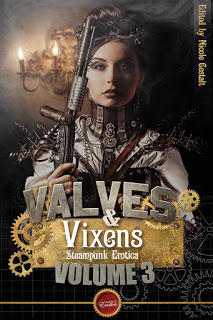by Jean Roberta
My original plan for this post was to discuss words for sex acts and sex organs, as did Lisabet Sarai earlier this month. Context is very important to me, and this is why some of the shorter pieces that have been posted in ERWA Storytime make me uneasy, especially if they refer to such characters as “the office slut.” Has any woman who works in an office ever considered herself The Office Slut?
I don’t object to the word “slut” per se, but context is crucial. The purpose of most offices is to produce a product or a service other than sex. If someone in the office is known as the official Slut, she is probably not taken seriously as an assistant or editor, or whatever role she was hired to fill. (For more on this subject, see Nine to Five, the 1980 movie about working women in which Dolly Parton plays the role of a private secretary who is ostracized by everyone in the office because everyone thinks she is having an affair with her boss. She isn’t.)
Even literary erotica sometimes implies what porn films explicitly promise: that viewers/readers can visit a kind of alternative dimension, where great sex is always happening, and it is available to everyone who visits there. Rumors about actual places on earth where, supposedly, anyone could have consequence-free sex with anyone else at any time flourish best in real-world environments where sex is hard to get (e.g. high school, most workplaces, jurisdictions where “obscenity” is broadly defined and highly illegal). In the Land of Blooming Orgasms, supposedly, no one has to experience the frustration, rejection, humiliation, or competition for mates that characterize the real world.
A traditional double standard of sexual morality lends itself to belief in the Land of Blooming Orgasms. An extreme division of women into the good and the bad, based on sexual history, usually divides Virgins from Sluts as though these words defined different personality types rather than phases in a life. (Everyone starts out as a virgin, but anyone who stays that way for a lifetime has been deprived of much valuable experience.) Sluts can be imagined as having constant sex with random strangers whenever they are out of sight, not doing something more mundane.
The biological differences between males and females might encourage males (straight, gay or bi, but not trans) to believe that some women have sex constantly. Men know that they simply aren’t equipped to get aroused, ejaculate, then repeat the process again, and again, and again. Even the mightiest stud has his limits. Females, however, can be penetrated in every orifice as many times as they want – and if their desire has limits, the ability of others (armies or gangs) to rape them has no limits.
And therefore the myth of the constant Slut pops up in various contexts, and is often treated more seriously than it deserves. When I had sex for the first time with a boy I liked, it was a fumbling affair of mutually-missed opportunities. I was a teenager, and I had only a vague idea of what to do. Nonetheless, as soon as the boy had caught his breath, he said: “You must have done this a lot.” Apparently one fuck had transformed me from a nice girl with no experience into the eternal Slut. I was tempted to respond with teenage snark. (Well, I’ve spent the last five years in a whorehouse in Tiajuana.) Luckily, I didn’t say what I was thinking. I realized even then that the school gossip network would have accepted that statement, embroidered it, and circulated it throughout our small town.
This leads me back to erotic writing, a more wholesome exercise of imagination than gossip about actual people. References to the Office Slut, the Town Slut, the Wild Slut of the Jungle, or the Interplanetary Slut suggest fantasies about the Land of Blooming Orgasms. This is escape literature or masturbation material, and its charm is obvious. It’s not realistic, and intelligent authors don’t intend it to be mistaken for realism.
However, the tone of a piece of erotic writing isn’t always clear, or consistent. (If your goal is to write something entertaining and unbelievable, snark is good.) References to the Office Slut can sound negative, not because sexual skill or experience are necessarily bad, but because women are so often accused of being Sluts instead of whatever they appear to be: secretaries, administrators, students, teachers, mothers, faithful companions.
If I’m reading a piece about Captain Luscious of the Starfuck Fleet, I would like to see some reference to her actual ability to fly a space vehicle, even if it’s only mentioned in passing. This information would raise her above the level of a cartoon, or an insult. In the real world, even sex workers eat, sleep, do laundry, pay bills, meet friends for coffee, and raise the children for whom they need to earn money.
Besides, the sexiest stories are those that suggest the possibility of good sex in the messy, complex world where people actually live.




